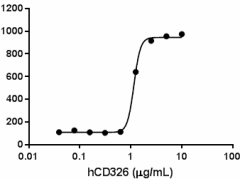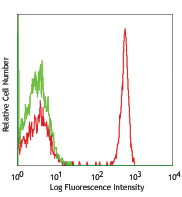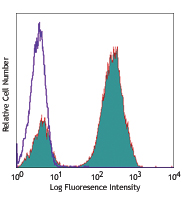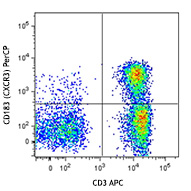- Regulatory Status
- RUO
- Other Names
- Cluster of differentiation 326, Epithelial cell adhesion molecule, Adenocarcinoma-associated antigen, Cell surface glycoprotein Trop-1, TROP1, Epithelial glycoprotein, EGP, Epithelial glycoprotein 314, EGP314, KS 1/4 antigen, KSA
- Ave. Rating
- Submit a Review
- Product Citations
- publications

-

Recombinant human CD326/EPCAM supports the adhesion of L929 cells in a dose dependent manner. ED50 for this effect is 0.4 - 1.6 µg/mL. Calcein-AM (Cat. No. 425201) was used to measure the number of adherent cells. -

Stability testing for recombinant human CD326/EPCAM. Recombinant human CD326/EPCAM was aliquoted in PBS, pH 7.2 at 0.2 mg/mL. One aliquot was frozen and thawed four times (4x freeze/thaws), and compared to a control kept at 4°C (control). The samples were tested in an adhesion assay with L929 cells.
EPCAM is a type I transmembrane protein, composed of thyroglobulin type I domain on the extracellular domain, a transmembrane region and a 26-amino acid intracellular region. EPCAM is expressed in epithelial tissues, but it cannot be detected in normal squamous epithelia except carcinoma. In mice, the homolog of human EPCAM has been found in thymic epithelial cells, thymocytes, T cells and dendritic cells. The expression level of EPCAM differs among tissues, but it is higher in proliferating cells than in differentiated cells. Several studies demonstrated that EPCAM is involved in cell adhesion, proliferation, migration and gene expression. EPCAM mediates homophilic cell-cell adhesions in Ca2+-independent manner. Its N-terminal domain is necessary for adhesion. In addition, EPCAM serves as a diagnostic biomarker of cancer. High level of EPCAM is found in several carcinoma and correlates with tumor progression in cervical neoplasia and survival in breast cancer patients. EPCAM associates with the tight junction protein claudin 7, resulting in tumor growth, metastasis formation and apoptotic resistance. EPCAM undergoes intramembrane proteolysis, catalyzed by TNF-α converting enzyme (TACE) and presenilin-2 (PS-2/γ-secretase), which in turn produces the extracellular (EpEX) and intracellular (EpICD) domains of EPCAM. EpICD forms a nuclear complex with β-catenin, its co-activator FHL2 and Lef-1. It has been indicated that EPCAM upregulates oncogenic transcriptional factor c-myc and cell cycle-related proteins Cyclin A/E. Furthermore, EPCAM can induce expression of reprogramming factors, including OCT4, SOX2 and NANOG. EPCAM is a potential target in cancer therapy. Antibodies against EPCAM and vaccine-based clinical trials in different carcinoma have been conducted.
Product DetailsProduct Details
- Source
- Human EPCAM, amino acid Gln24-Lys265 (Accession # P16422), with 6His tag, was expressed in 293E cells.
- Molecular Mass
- The 248 amino acid recombinant protein has a predicted molecular mass of approximately 28.2 kD. The DTT-reduced and non-reduced protein migrates at approximately 36.5 kD respectively by SDS-PAGE. The predicted N-terminal amino acid is Gln.
- Purity
- > 95%, as determined by Coomassie stained SDS-PAGE.
- Formulation
- 0.22 μm filtered protein solution is in PBS, pH 7.2
- Concentration
- 10 and 25 µg sizes are bottled at 200 µg/mL. 100 µg size and larger sizes are lot-specific and bottled at the concentration indicated on the vial. To obtain lot-specific concentration and expiration, please enter the lot number in our Certificate of Analysis online tool.
- Storage & Handling
- Unopened vial can be stored between 2°C and 8°C for up to 2 weeks, at -20°C for up to six months, or at -70°C or colder until the expiration date. For maximum results, quick spin vial prior to opening. The protein can be aliquoted and stored at -20°C or colder. Stock solutions can also be prepared at 50 - 100 µg/mL in appropriate sterile buffer, carrier protein such as 0.2 - 1% BSA or HSA can be added when preparing the stock solution. Aliquots can be stored between 2°C and 8°C for up to one week and stored at -20°C or colder for up to 3 months. Avoid repeated freeze/thaw cycles.
- Application
-
Bioassay
- Application Notes
-
BioLegend carrier-free recombinant proteins provided in liquid format are shipped on blue ice. Our comparison testing data indicates that when handled and stored as recommended, the liquid format has equal or better stability and shelf-life compared to commercially available lyophilized proteins after reconstitution. Our liquid proteins are verified in-house to maintain activity after shipping on blue ice and are backed by our 100% satisfaction guarantee. If you have any concerns, contact us at tech@biolegend.com.
-
Application References
(PubMed link indicates BioLegend citation) -
- Balzar M, et al. 2001. Mol. Cell. Biol. 21:2570.
- Nelson AJ, et al. 1996. Eur. J. Immunol. 26:401.
- Schnell U, et al. 2013. Biochim. Biophys. Acta. 8:1989.
- Nübel T, et al. 2009. Mol. Cancer Res. 7:285.
- Münz M, et al. 2004. Oncogene 23:5748.
- Philip R, et al. 2015. Oncotarget. 6:2046.
- Maetzel D, et al. 2009. Nat. Cell. Biol. 11:162.
- Armstrong A, Eck SL. 2003. Cancer Biol. Ther. 2:320.
- Lin CW, et al. 2012. J. Biol. Chem. 287:39449.
Antigen Details
- Structure
- Monomer
- Distribution
-
Undifferentiated embryonic stem cells, epithelial cells, adenocarcinoma; Plasma membrane
- Function
- EPCAM mediates Ca2+-independent homophilic intercellular adhesion and it is involved in tumor progression.
- Interaction
- Claudin 7, β-catenin, FHL2
- Ligand/Receptor
- EPCAM
- Bioactivity
- Measured by its ability to support the adhesion of L929 cells
- Biology Area
- Cell Biology, Immunology, Stem Cells
- Molecular Family
- Adhesion Molecules, CD Molecules
- Gene ID
- 4072 View all products for this Gene ID
- UniProt
- View information about CD326 on UniProt.org
Related Pages & Pathways
Pages
Related FAQs
- Why choose BioLegend recombinant proteins?
-
• Each lot of product is quality-tested for bioactivity as indicated on the data sheet.
• Greater than 95% Purity or higher, tested on every lot of product.
• 100% Satisfaction Guarantee for quality performance, stability, and consistency.
• Ready-to-use liquid format saves time and reduces challenges associated with reconstitution.
• Bulk and customization available. Contact us.
• Learn more about our Recombinant Proteins. - How does the activity of your recombinant proteins compare to competitors?
-
We quality control each and every lot of recombinant protein. Not only do we check its bioactivity, but we also compare it against other commercially available recombinant proteins. We make sure each recombinant protein’s activity is at least as good as or better than the competition’s. In order to provide you with the best possible product, we ensure that our testing process is rigorous and thorough. If you’re curious and eager to make the switch to BioLegend recombinants, contact your sales representative today!
- What is the specific activity or ED50 of my recombinant protein?
-
The specific activity range of the protein is indicated on the product datasheets. Because the exact activity values on a per unit basis can largely fluctuate depending on a number of factors, including the nature of the assay, cell density, age of cells/passage number, culture media used, and end user technique, the specific activity is best defined as a range and we guarantee the specific activity of all our lots will be within the range indicated on the datasheet. Please note this only applies to recombinants labeled for use in bioassays. ELISA standard recombinant proteins are not recommended for bioassay usage as they are not tested for these applications.
- Have your recombinants been tested for stability?
-
Our testing shows that the recombinant proteins are able to withstand room temperature for a week without losing activity. In addition the recombinant proteins were also found to withstand four cycles of freeze and thaw without losing activity.
- Does specific activity of a recombinant protein vary between lots?
-
Specific activity will vary for each lot and for the type of experiment that is done to validate it, but all passed lots will have activity within the established ED50 range for the product and we guarantee that our products will have lot-to-lot consistency. Please conduct an experiment-specific validation to find the optimal ED50 for your system.
- How do you convert activity as an ED50 in ng/ml to a specific activity in Units/mg?
-
Use formula Specific activity (Units/mg) = 10^6/ ED50 (ng/mL)
Customers Also Purchased


 Login / Register
Login / Register 











Follow Us